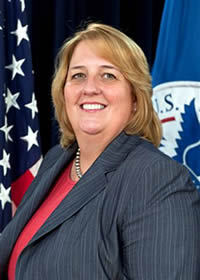 Why She Matters
Why She Matters
As chief privacy officer of the Department of Homeland Security (DHS), Callahan is responsible for not only supporting the department’s mission but also protecting individuals’ privacy and ensuring the programs created don’t erode privacy protections.
Callahan accomplishes these goals by partnering with program managers as they develop new programs, technologies or responsibilities as authorized by Congress.
Callahan does this by looking at how DHS data is collected, how long information is going to be stored, the information’s ultimate destination and inquiring about the authority behind the information gathering to begin with. She then, with DHS program officers’ help, designs programs throughout the department to make sure they comply with both the DHS responsibilities as well as privacy laws.
Callahan also serves as the department’s chief Freedom of Information Act officer, which entails processing FOIA requests appropriately, efficiently and in a timely manner.
In addition to her main job, Callahan also serves as vice-chair of the American Bar Association’s Privacy and Information Security Committee of the Antitrust Division. She also co-chairs both the Chief Information Officers Council’s Privacy Committee, and the Information Sharing Environment Privacy Guidelines Committee.
Path to Power
After graduating from the University of Pittsburg with a degree in political science and Russian/East European studies, Callahan worked for four years on a program at the Library of Congress on developing parliamentary institutions in Eastern Europe.She then went on to work for the law firm of Hogan & Hartson (now Hogan Lovells), where for 12 years she specialized in privacy and data security law.
The Issues
At DHS, it’s the chief privacy officer’s job to ensure there’s an architecture and system in place for protection and security associated with the federal government online system (all .gov web sites). This system not only defends the .gov space from attacks, but it’s also important in making sure the department isn’t inappropriately reaching or accessing information it shouldn’t be, retaining information for too long or using it illegal or unethical purposes.
Transparency
In the 2010 fiscal year, the department received 130,000 FOIA requests, a substantial increase from the 103,000 it received in the 2009 fiscal year.
However, DHS has also been able to decrease its FOIA backlog by 40 percent. This is mostly due to the fact that it’s the only department that has implemented a proactive disclosure process by examining the most common types of FOIA requests and automatically disclosing the information on its web site before even being asked to do so.
The Network
During the spring of 1996, while attending law school at the University of Chicago, Callahan had President Barack Obama as a professor for a constitutional seminar class called “Racism and the Law.” During that time, President Obama was running for the state Senate for the first time.
Other highly-notable professors Callahan took courses under at the University of Chicago include U.S. Supreme Court Justice Elena Kagan and Cass Sunstein, Administrator of the White House Office of Information and Regulatory Affairs.
One of Callahan’s former colleagues at Hogan & Hartson, Christine Varney, is also the Assistant Attorney General for Antitrust at the U.S. Department of Justice.
Interview with Mary Ellen Callahan on Oct. 22, 2010. Tey-Marie Astudillo/MNS

